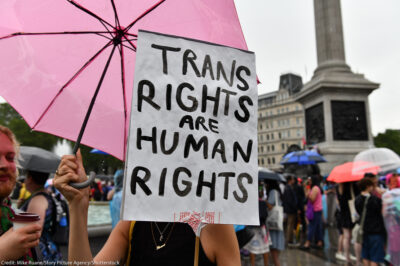Atlanta Lesbian Couple 'Related' Through Vermont Civil Union, ACLU Says in Appeal of Custody Case
FOR IMMEDIATE RELEASE
ATLANTA, GA – A woman being denied visitation with her own children because she lives with her same-sex partner should be allowed to see her kids because she and her partner are “”related”” by a Vermont civil union, the American Civil Liberties Union said in court papers filed today.
A state court ruled last year that Susan Freer was violating a visitation agreement that said she couldn’t see her children while she was living with an adult to whom she wasn’t either married or “”related within the second degree.”” Freer, who shares a home with her partner, is appealing that decision.
“”Susan hasn’t seen her 9-year-old or her 12-year-old twins in a year, even though she is in compliance with the original court-ordered visitation agreement,”” said Debbie Seagraves, Executive Director of the ACLU of Georgia. “”We hope – and expect – that the court will see that this is just plain wrong.””
The civil union the couple received in Vermont on July 4, 2000, makes them “”related within the second degree”” under Georgia law, which recognizes a range of non-blood, non-marital relationships – including those established outside the state – the ACLU said in its friend-of-the-court brief filed in a state court appeals court.
“”Thanks to Vermont’s civil unions, this couple was able to legally demonstrate their level of commitment to each other,”” Seagraves said. “”There should be no question that these women are closely related, and the original visitation order should be enforced immediately.””
The 25-page brief filed today by the ACLU of Georgia and the ACLU’s national Lesbian & Gay Rights Project goes beyond interpreting legal definitions of “”related,”” and argues that Freer’s constitutional rights are being violated.
“”People have a right to create a family, choose who to live with, and decide who can be around their kids,”” Seagraves said, citing constitutional rights to privacy, due process and equal protection under the law. “”Those fundamental rights don’t depend on whether you’re gay, or where you live.””
Until now, much of Freer’s case has focused on whether a court will force the state to recognize Vermont’s civil union as the equivalent of marriage. While that may well be the result, the ACLU contends that the civil union shows that the two are in a loving, committed, long-term relationship and thus legally related at the very least.
Today’s case is Burns v. Burns [Freer legally took the name of her partner last year, but remains with her original name in court records.], Case No. A01A1827 in the Georgia Court of Appeals.
Stay Informed
Every month, you'll receive regular roundups of the most important civil rights and civil liberties developments. Remember: a well-informed citizenry is the best defense against tyranny.




